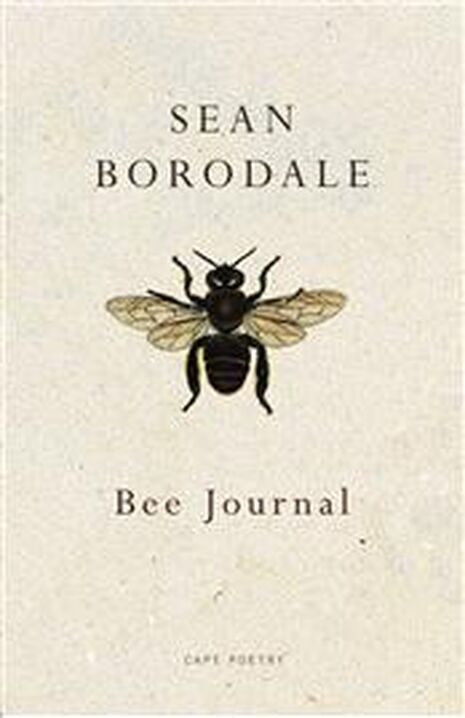Poetry: Sean Borodale – Bee Journal
Giles Pitts is fascinated by the beauty of this T.S.Eliot prize-nominated poetry collection inspired by the insights of bee-keeping.

This is a meditative, attentive and beautiful debut collection from Sean Borodale, who was named a Granta New Poet earlier in the year. Shortlisted for the T.S. Eliot prize, Bee Journal is a sequence of poems with dates as titles, charting the two years Borodale spent as an apiarist. It is a window into a life lived in fascinated parallel with bees.
The hive, with its hierarchy in which each individual contributes to collective industry, has long functioned as a metaphor for the well-ordered polis, perhaps most famously in Canterbury’s advice to the king in Shakespeare’s Henry V: honey bees are 'Creatures that by a rule of nature teach / The act of order to a peopled kingdom’. Borodale, too, learns about his own endeavours - indeed his own existence - through his bees. This learning occurs, however, not through the figurative application of their lives to his own, but instead through his poet's patience and observation - through the time he spends with the textures, sounds and patterns of the hive. He excels at charting the subtle changes of his own perception of the world, brought about by prolonged contact with another, strikingly different, life form: ‘You have gradated us: / vibrations, colours, trajectories of substance, / and the thermals / turning this house to align with yours.’
Borodale’s craft is entwined with that of his bees. Sometimes he allows us to imagine that the contact is comically literal - ‘bees batting this pen and poem’s paper’ - but elsewhere it is left implicit in the voice, soaked in a spiritual admiration that he gives to the ‘mute strength’ of the honeycomb’s design, ‘plain as a Shaker would fashion a drawer; / materially earnest, / divine, pure of toil’. The processes of the poet’s craft - the progression from noted moment into finished verse - are evidenced within the verse itself. The poems often begin in a journal’s clipped, matter-of-fact tone (‘Put seven frames into the Honey Super, / having taken the empty syrup feeder’) before progressing in uneven free verse stanzas to a more lyrical style, seeking out their own forms and sound patterns such as in the conclusion to the entry for ‘February 26th’ where the bees ‘fan out of the door a Minerva beard, / lay out the flight paths, the locks of hair, / combing the air’s amnesia to a noise.’
Bee Journal is an intimate collection. The early poems are marked by an anxious search for the Queen: ‘the bees all blackened to a clutch, a clot: / she must be there’, an attitude which, by the end of the sequence, morphs into a lover’s regard: ‘Those eyes are like castanets, cast nets; / woman all feral and ironwork, I slip / under the framework, into the subtle’. Borodale is willing to see all life through the lens of bee and beekeeper and so these poems range far beyond just the hive. ‘10th February: Dismantling the Comb’, for example, is a deeply moving account of bereavement, the poet shining light into the comb’s cells in a fruitless search for life: ‘It’s like the grain of a moon, a spoon-back of pale no one, / just the pail of an egg’s dry opal empty of hunger’. The finest poem, ‘12th November: Winter Honey’, has a Hughesian ring to it, expressing the same interest in nature's physical, textured manifestations: ‘To be honest, this is dark stuff; mud, tang / of bitter battery-tasting honey. The woods are in it.’
It is to Borodale’s credit that he never claims to "think like a bee" - indeed, he acknowledges the impossibility of doing so. Instead he gazes intently at his subjects and then steps back to write with precision, wonder, and a respect for what remains unknown. ‘And we, beekeepers, / can only open the book part way to read what is unsaid, / Not being your drones we do not see like you.’
 Features / 3am in Cambridge25 June 2025
Features / 3am in Cambridge25 June 2025 Comment / Why shouldn’t we share our libraries with A-level students?25 June 2025
Comment / Why shouldn’t we share our libraries with A-level students?25 June 2025 Theatre / Twelfth Night almost achieves greatness26 June 2025
Theatre / Twelfth Night almost achieves greatness26 June 2025 News / Revealed: Emmanuel relies most on postgrad supervisors28 June 2025
News / Revealed: Emmanuel relies most on postgrad supervisors28 June 2025 Features / What it’s like to be an underage student at Cambridge29 June 2025
Features / What it’s like to be an underage student at Cambridge29 June 2025





